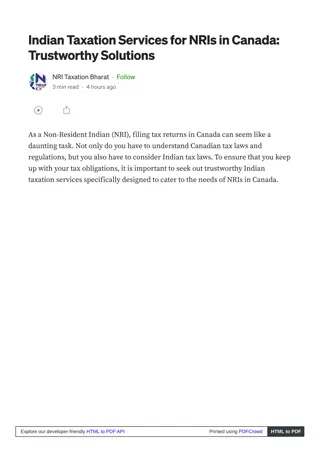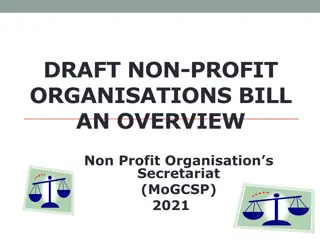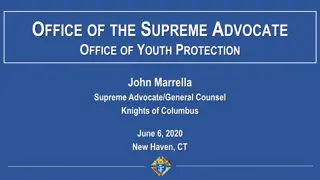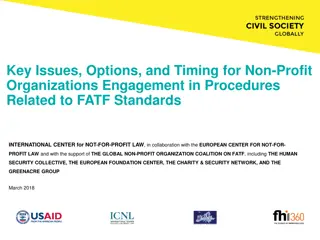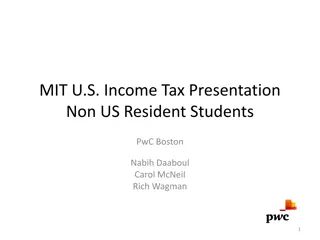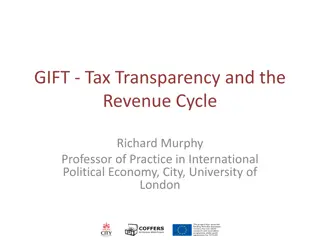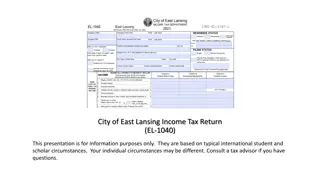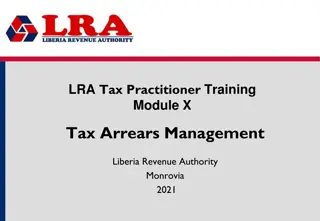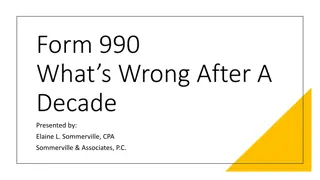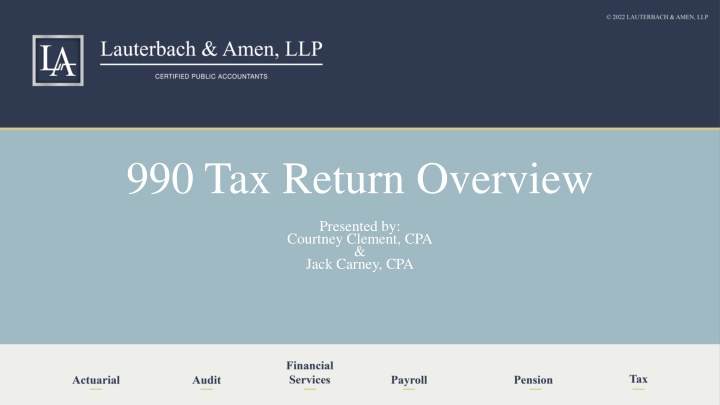
Tax Return Overview for Tax-Exempt Organizations
Learn about the filing requirements, due dates, and types of 990 tax returns for tax-exempt organizations. Understand the importance of Schedule A and how it distinguishes a tax-exempt entity as a public charity. Stay informed about the necessary steps to maintain tax-exempt status and avoid penalties.
Download Presentation

Please find below an Image/Link to download the presentation.
The content on the website is provided AS IS for your information and personal use only. It may not be sold, licensed, or shared on other websites without obtaining consent from the author. If you encounter any issues during the download, it is possible that the publisher has removed the file from their server.
You are allowed to download the files provided on this website for personal or commercial use, subject to the condition that they are used lawfully. All files are the property of their respective owners.
The content on the website is provided AS IS for your information and personal use only. It may not be sold, licensed, or shared on other websites without obtaining consent from the author.
E N D
Presentation Transcript
990 Tax Return Overview Presented by: Courtney Clement, CPA & Jack Carney, CPA
Overview Filing Requirements & Due Dates Section B & Schedule A Unrelated Business Income Change in Accounting Period Audit Requirements Key Pieces of Return 2
Required to File Tax-exempt organizations Nonexempt charitable trusts Section 527 political organizations 3
Filing Requirements Exempt organizations are required to file annual returns. If an organization does not file or files late, the IRS may assess penalties. If an organization does not file as required for three consecutive years, it automatically loses its tax-exempt status. Paper filing is no longer allowed and electronic filing is now mandatory for all tax-exempt entities. Returns filed on paper will be returned. This requirement is unique to tax exempt organizations. Who can sign the return? 4
Due Dates and Extensions State 6 months after FYE Allowed two 60-day extensions 1st extension = $0 2nd extension = $15 If a second extension is filed, there is not an additional filing fee The IL AG office is processing returns before extensions, therefore generating unwarranted notices. Federal 4.5 months after FYE One 6-month extension 5
Types of 990s 990N Gross receipts < $50,000 990EZ Gross receipts < $200,000 AND Total assets < $500,000 990 Gross receipts > $200,000 OR Total assets > $500,000 Most tax-exempt organizations will file this form 6
Schedule A For many non-profit organizations, Schedule A is the most important part of the Form 990. The purpose of Schedule A is to provide information about the public charity status and public support of the tax-exempt entity. This is how a tax-exempt entity distinguishes itself as a public charity and not a private foundation. Most, but not all non-profits will select Box 10 an organization that receives more than 33 1/3% of its support from contributions, membership fees, and gross receipts from activities related to its exempt function. 8
Schedule A Part III should be completed if Part I, Box 10 was selected. For Part III, gifts, grants and contributions and program service revenue counts towards the public support calculation. Public support is calculated and reported on line 15. This is the most important line on the Schedule. In order to meet the public support test, the calculated percentage of public support must be greater than 33 1/3%. 9
Unrelated Business Income Even though an organization is recognized as tax exempt, it still may be liable for tax on its unrelated business income. For most organizations, unrelated business income is income from a trade or business, regularly carried on, that is not substantially related to the charitable, educational, or other purpose that is the basis of the organization's exemption. An exempt organization that has $1,000 or more of gross income from an unrelated business must file Form 990-T. 11
Unrelated Business Income Business activities of an NPO are regularly conducted if they are frequent and continuous and are pursued in a manner like comparable commercial activities of for profit organizations. Specific Exclusions from UBI: Dividends Interest Annuities Payments 12
Change in Accounting Period An organization may change its accounting period by filing a return for the short tax period that results from the change. A "short tax period" is an accounting period of less than 12 months, and usually occurs when an organization starts operations, changes its accounting period or terminates. It must write "Change in Accounting Period" at the top of this short period return. The next return would cover the new accounting period. 13
Audit Requirements State of IL Gross Revenue > $300,000 in the year or Paid professional fundraiser which raised contributions in excess of $25,000 14
Key Pieces Program Service Accomplishments Most important piece of the 990 return Not financially driven narrative in nature Gives Foundation the opportunity to explain their purpose Key personnel & board members Year of return NOT current year Top paid employees 15
Statement of Functional Expenses Required for NPO audit report 3 buckets Management & General Oversight, business management, general record keeping, related admin activities except for direct conduct of program services or fundraising activities Should not be the largest percentage of expenses Many salaries can split between management & general and program Program Services Should be largest percentage of expenses Overall purpose of the entity and why they are tax exempt Fundraising Not required to be a separate statement 16
In-Kind Donations - Audit Donated goods or services Goods Auction items Capital assets Equipment Services Specialized in nature (attorney provides pro bono legal advice) = must be recorded in the income statement Not specialized in nature (attorney volunteers at a 5k) = disclosure only Most common, Park District employees will volunteer to do the accounting for the Foundation Wash on the income statement Debit In Kind Expense Credit In Kind Revenue 17
In-Kind Donations - Tax Donated Goods Recorded as revenue on the return Donated Services / Use of Facilities NOT recorded as revenue on the return Reconciling item on Schedule D 18
Contact Information Courtney Clement, CPA cclement@lauterbachamen.com Jack Carney, CPA jcarney@lauterbachamen.com 19


![Town of [Town Name] Real Estate Tax Rates and FY 2024 Budget Summary](/thumb/62211/town-of-town-name-real-estate-tax-rates-and-fy-2024-budget-summary.jpg)

